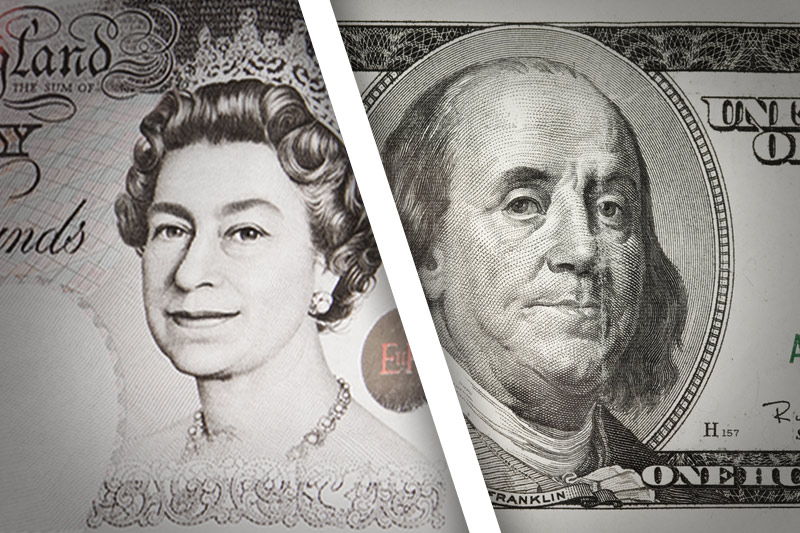Investing.com - The pound remained higher against the U.S. dollar on Friday, despite a string of disappointing U.K. economic reports, as lower-than-expected U.S. jobs data broadly weighed on demand for the greenback.
GBP/USD hit 1.5681 during U.S. morning trade, the pair's highest since August 21; the pair subsequently consolidated at 1.5636, rising 0.30%.
Cable was likely to find support at 1.5506, the low of September 2 and resistance at 1.5667, Thursday's high and a two-week high.
The pound came under pressure earlier, after official data showed that U.K. manufacturing production rose 0.2% in July, confounding expectations for a 0.3% rise, after an upwardly revised 2% increase the previous month.
A separate report showed that the U.K. trade deficit widened to GBP9.85 billion in July, from a dwonwardly revised deficit of GBP8.17 billion the previous month. Analysts had expected the trade deficit to narrow to GBP8.15 billion in July.
In addition, the Bank of England said that inflation expectations for the third quarter ticked down to 3.2% from 3.6%. in the three months to June.
Data also showed that U.K house prices rose less-than-expected in August, ticking up 0.4% after a 0.9% increase the previous month. Analysts had expected house prices to rise 0.7% last month.
But the greenback weakened broadly after the Bureau of Labor Statistics said the U.S. economy added 169,000 jobs in August, less than the expected 180,000 increase, after a downwardly revised 104,000 rise the previous month.
The report also showed that the U.S. private sector added 152,000 jobs last month, compared to expectations for a 180,000 rise, following a downwardly revised increase of 127,000 in July.
The U.S. unemployment rate ticked down to 7.3% in August, from 7.4% in July, as more people left the workforce. Analysts had expected the unemployment rate to remain unchanged last month.
Sterling was lower against the euro with EUR/GBP adding 0.12%, to hit 0.8426.
The euro came under pressure after downbeat German data fuelled fresh concerns over the strength of the recovery in the euro zone's biggest economy.
Official data on Friday showed that German industrial production dropped 1.7% in July, compared to expectations for a 0.5% fall, after a downwardly revised 2% rise the previous month.
A separate report showed that Germany's trade surplus narrowed unexpectedly to EUR14.5 billion in July, from an upwardly revised surplus of EUR15.8 billion the previous month. Analysts had expected the trade surplus to expand to EUR16.1 billion in July.
GBP/USD hit 1.5681 during U.S. morning trade, the pair's highest since August 21; the pair subsequently consolidated at 1.5636, rising 0.30%.
Cable was likely to find support at 1.5506, the low of September 2 and resistance at 1.5667, Thursday's high and a two-week high.
The pound came under pressure earlier, after official data showed that U.K. manufacturing production rose 0.2% in July, confounding expectations for a 0.3% rise, after an upwardly revised 2% increase the previous month.
A separate report showed that the U.K. trade deficit widened to GBP9.85 billion in July, from a dwonwardly revised deficit of GBP8.17 billion the previous month. Analysts had expected the trade deficit to narrow to GBP8.15 billion in July.
In addition, the Bank of England said that inflation expectations for the third quarter ticked down to 3.2% from 3.6%. in the three months to June.
Data also showed that U.K house prices rose less-than-expected in August, ticking up 0.4% after a 0.9% increase the previous month. Analysts had expected house prices to rise 0.7% last month.
But the greenback weakened broadly after the Bureau of Labor Statistics said the U.S. economy added 169,000 jobs in August, less than the expected 180,000 increase, after a downwardly revised 104,000 rise the previous month.
The report also showed that the U.S. private sector added 152,000 jobs last month, compared to expectations for a 180,000 rise, following a downwardly revised increase of 127,000 in July.
The U.S. unemployment rate ticked down to 7.3% in August, from 7.4% in July, as more people left the workforce. Analysts had expected the unemployment rate to remain unchanged last month.
Sterling was lower against the euro with EUR/GBP adding 0.12%, to hit 0.8426.
The euro came under pressure after downbeat German data fuelled fresh concerns over the strength of the recovery in the euro zone's biggest economy.
Official data on Friday showed that German industrial production dropped 1.7% in July, compared to expectations for a 0.5% fall, after a downwardly revised 2% rise the previous month.
A separate report showed that Germany's trade surplus narrowed unexpectedly to EUR14.5 billion in July, from an upwardly revised surplus of EUR15.8 billion the previous month. Analysts had expected the trade surplus to expand to EUR16.1 billion in July.
